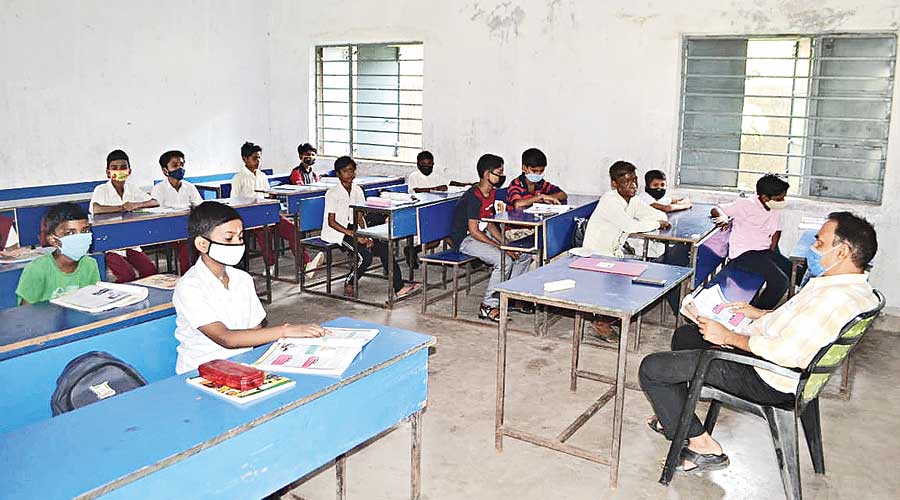Teachers of middle schools (Classes VI to VIII) in Jharkhand are finding it difficult to run in-person classes because of a dearth of funds for “essential expenditure”.
“It’s due to a crisis of funds for meeting essential expenditure and not our reluctance to resume classes after such a long closure of schools,” said Nasim Ahmad, spokesperson of the Akhil Jharkhand Prathamik Sikshak Sangh that has many members teaching in middle schools after their primary schools were merged with or upgraded to middle schools.
Following improvement in the Covid situation, the state government allowed physical classes for students of VI to VIII in government-run schools from September 24.
There are over 32,000 such schools in the state where more than 70,000 teachers are engaged for teaching students up to Class VIII, Ahmad further said, adding that most of those institutions also faced shortage of teachers.
“We have no funds available with us though we have to spend money for making these schools run,” Ahmad said, adding that they had to clean and sanitise the school premises and disinfect doors, tables and benches before starting classes.
Besides, the teachers also have to submit many reports and returns for which they need to get photocopies of many documents in the market, he further said. They also have to photocopy question papers for conducting offline examinations for students studying in Classes III to VIII, he added.
“All these things require money but we don’t have anything at the moment,” Ahmed said, adding that they had to manage by spending from their own pockets.
“We are entitled to get an annual allotment of funds for those expenditure,” he replied when asked how they managed earlier.
He said the funds allotted for the current financial year (2021-22) had to be returned after the Jharkhand Education Project Council that controls these schools directed them to do so.
The state government had earlier allowed offline classes for high school students in a staggered manner, beginning with Classes IX and XI. The education department now allowed offline classes for those studying in Classes VI to VIII.
Depending on the number of students attached to these institutions, the schools are entitled to get an annual grant of Rs 25,000 or above for meeting such expenditures, Ahmed said, adding that the funds surrendered should now be re-allocated to the schools.
“Our problem is a bit different and we have to face funds crunch even when the grant is released,” said Naveen Kumar, a teacher at Visti Para Madhya Vidyalaya at Hirapur in Dhanbad, which is now attached to an adjacent high school.
“Our middle school had an electricity connection when it ran independently before the merger,” Kumar said, adding that they now faced problem for paying the electricity bill for that connection or even getting a fan repaired “because the funds given by the government is controlled by the high school that often deprives us”.
“This should be properly channelled so that they don’t face any problem such as disconnection of power supply,” he said.











